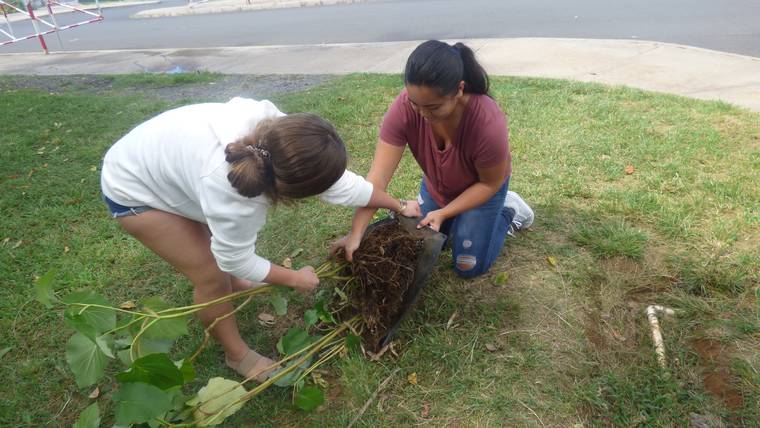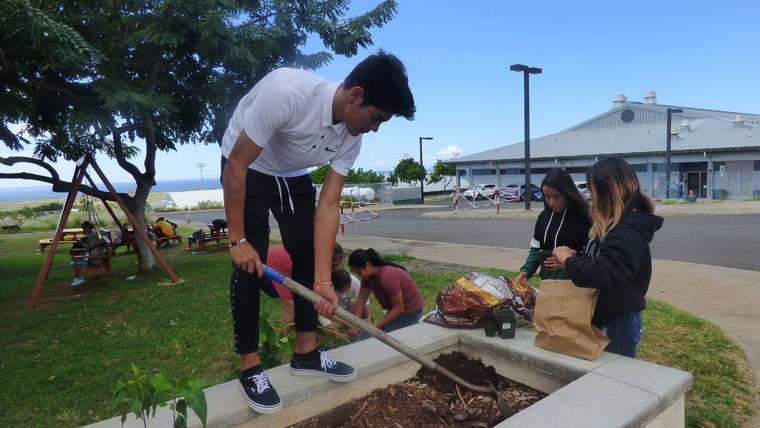KAILUA-KONA — The front lawn of the STEM building at Kealakehe High School has transformed from a blank canvas into a special place for learning.
Tables, planters, a big chess table and swings, or “kinetic learning benches,” form an outdoor seating area that can be used to hold classes with as many as 90 students.
“We’re on 53 acres at Kealakehe High School, and our building footprint is on less than a fifth of that. So there’s a lot of space. I think kids learn better out here,” said Kealakehe CTE and robotics coordinator and math teacher Justin Brown. “We’ve taught up to 90 people here at one time. Instead of being in a classroom, I think sitting out here is quite lovely.”
The outdoor classroom project is a collaborative effort between the STEM teachers and students at Kealakehe. All of the objects in the space were built by the students, who used their knowledge of engineering and architecture to create the projects.
On Thursday, health and science teacher Gigi Goochey led a team of five students to the outdoor space to plant medicinal plants as part of their project to learn about different healing techniques, including la‘au lapa‘au.
La‘au lapa‘au is the art of Hawaiian herbal medicine practiced by ancient Hawaiians. Kealakehe sophomores Mia Domingo, Auriella Rodrigues, Tasia Hays, and juniors Mitchell Monrroy and Dannia Andrade have planted olena, maiapilo, and ko‘oko‘olau at the outdoor classroom in a planter made by Waverider STEM and architecture students.
Plants were donated to Goochey’s class by the Queen Liliuokalani Trust and Hawaii Community College — Palamanui.
“My department is with the STEM department and so I was over there and asked if I could use a planter they were building there,” Goochey said. “My sixth period took it over as their project and then we reached out to Queen Liliuokalani Trust and Richard Stevens at the college and they donated the plants for us to use.”
Goochey also teaches in the pre-nursing program at HCC — Palamanui, and her class at Kealakehe is used as a bridge between high school and college courses.
“This was developed because we have a shortage of medical personnel in the country and especially in Hawaii and how do we get these kids ready?” Goochey said. “I teach in the pre-nursing program at the college and kids would come straight from here and they’re not ready.”
The STEM students who helped create the outdoor classroom can also use their new-found knowledge to apply to the “real world.”
Seniors Robert Dempsey and Nathan Weir said there are plans to create another planter and also to create solar-powered charging stations at the tables.
“There was actually a tour at University of California, Irvine that we did that had a similar setup, and we were like, we should do that,” Brown said.
Brown said the DOE pays more than $1 million per classroom space, and the outdoor classroom has only cost $10,000, with the same capacity as a traditional classroom.
“One classroom period a day comes out here and we can put that up for $10,000,” Brown said. “Kids can learn how to do things, and that seems like a much better solution space, especially if we can get some green things in there.”
Brown said in addition to planning and creating the tables, swings, and planter, the students also prepped the space by doing a sound usage profile with a team that included the school’s original landscape architect.
The space creates enough acoustics for any teacher to be able to communicate with their classes without having to yell.
It’s also a safe space for students to hang out in their downtime before and after class.
“I see kids out here any time of day,” Goochey said. “I get here around 7:30 a.m. and there are always kids here. And at 4:30-5 p.m. there are still kids out here.”









